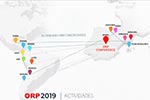

PRESENTATION – ORP Congress 2022
Sustainable Prevention: ethics, work and health for life

All You Need Is Life
Life, Life, Life and Work…
It may seem strange that we start by imitating such a well-known refrain, but sometimes we have to put things in their proper place and the life-work binomial is worth a little reflection, which will allow us to frame our ORPCongress 2022.
We are aware that trying to typify or try to define ‘work’ is, in itself, a hyper-complex task. Just trying to make a crude approximation of the concept or to establish a taxonomy of work, or if you prefer to try to unwind the skein of “what is considered work today” would be an unwieldy task that would challenge us in the first instance to try not to get entangled in the thousands of conceptual threads that we could stretch, about what is and what is not work… For example, the differences between the work of: writing poetry, air traffic control, informal mining, lyrical singing, deep-sea fishing, masonry, agriculture, manufacturing, scientific research… are jobs that undoubtedly have the same consistency, but in discussing the intrinsic differences, could be the subject of endless scientific meetings.
Therefore, we will avoid this arduous and at the same time lurid task and treat ‘work’ as a generic term, reflecting on this important part of our life, without even asking ourselves why and what for of our daily effort.
We accept the premise that, whatever the nature of work may be, the driving idea on which we rely is the imperative need to try to reduce and reconvert this sacrifice or effort into something that gives meaning to our existence and allows us all to generate wealth and enjoy a full life.
Treating work as if it were an entity that can be disintegrated from our leisure time seems naïve today, so we admit that we have “one and indivisible life”, and we must try to fit work into it; therefore, work must be healthy and safe per se.
The pandemic has also created the need for us to seriously consider the reorganisation of work and we believe that this historical moment could be a good starting point to try to balance and harmonise work and life conditions.
Having a global vision of jobs and the reward that citizens should receive for their development is, without a doubt, a key and current element of political discussion, to which organisational engineering, psychology, medicine and sociology and all those sciences and disciplines that touch, even tangentially, working conditions should be applied with intensity, in addition to governments and think tanks.
From our side of Occupational Safety and Health – and since one of our core tasks is to be directly involved in mitigating the negative effects of work and trying to revalue it – we should reflect early and deeply on the great impact this ‘New Post-Pandemic Work (NTpPW)’ has on companies and organisations and how it will affect our lives.
We have been persistently reflecting in our ORP Congresses on the changes that technology generates in the workplace and how they affect people’s health and we have been calling for years for special attention to the impacts of digitalisation, blockchain, robotics, AI, genetics… and proclaiming the need to always keep ethics in mind before each of these actions, as a mediator and buffer of potential conflicts.
But, once focused on the NTpP, we must at least evaluate those elements of work reorganisation that are providing a different vision of what work will mean from now on in people’s lives, and therefore we must try to identify and typify the new situations of work activity in order to generate the evaluation that clarifies and allows us to set the technical or organisational means to carry out our tasks in a healthy, safe and, of course, sustainable way.
You may be wondering, why the slogan of Sustainable Prevention? And even more: Does sustainability fit in prevention or is it rather a slogan to follow the sustainability fashion? This much-used concept, together with the concept of prevention, tries to bring together and give coherence to the different trends in Occupational Safety and Health (OSH) that are appearing in a somewhat disorganised way.
The concept of sustainability applied to OSH aims to place at the epicentre of the analysis of work the need to maintain the idea of Total Health, obviating once and for all the term occupational health.
Our current task from OSH would be to analyse the current problems at work and characterise them according to the data we already have and which are determined to show us the way to what sustainable work should look like for individuals.
For example, we know that when we add up deaths due to excessive working time and gas and fume pollution in the work area, they cause four times as many deaths as physical accidents, so how can we continue to be unconcerned about cutting this bloodletting? How could an international congress not focus on working hours and try to analyse how to adapt and redesign them in order to avoid the 750,000 deaths per year that are caused by excessive working hours or how not to have an impact on the 450,000 deaths caused by dust, fumes and other environmental pollutants?
While it is true that we have more than 350,000 deaths registered on the planet due to accidents at work, and that we should not under any circumstances minimise this drama, what we cannot allow is that excessive zeal in focusing our attention on this can distract us from the absolute values, which are weighing much more heavily on the universal scale of the accident rate.
This is why we believe that Sustainable Prevention is a concept that seeks to make definitive progress in the preservation of human health, since we already know that the quality of life and its length depends, barring accidents, on telomeres and that these are shortened by: stress, exposure to radiation, food, air quality, long working hours… We must seek all possible formulas to avoid this exogenous shortening caused by poor environmental conditions in the workplace.
We believe that for this Sustainable Prevention to fit into the companies of this NTpP, we need to include sustainability in the company’s strategy, adapt it to the daily work of prevention, analyse and measure exhaustively all the risks that can have an impact on the health of workers and, of course, generate a preventive policy that contemplates and puts into practice all the preventive measures that respect both the quality and the extension of people’s lives.
Hence, we believe that this holistic approach to sustainable prevention should be framed within the global vision of “ensuring people’s health, not only during their working life, and considering work as another variable to be controlled in the overall process of human life”.
This 22nd International ORP Congress is expected to be very different from the previous ones and, of course, from those we have experienced in the midst of the pandemic. It will be an ORPCongress that will seek to reflect openly on sustainability, with an emphasis on: new work organisations, working hours, distances from home to the workplace, food, the use and abuse of carbon and water footprints, new chemical products, nano products and nano materials, AI and new technologies… all of which will be intertwined with the common thread provided by ethics.
Our vocation, as always, is to generate this forum for universal debate, in which we can take up these topics and others that will appear during the exhibitions and seek compromises and solutions to the raging challenges of the moment. It makes sense that every year we bring together profiles as different as those of: workers, employers, OSH technicians, scientists, researchers, teachers, philosophers, thinkers and politicians, to try, together, to generate agile, efficient and quick solutions to be implemented in companies.
From the very beginning of the ORP Congresses, we set ourselves daring objectives, which would go off the beaten track, off the expected common line. We are convinced that the attendance during three days of work and reflection of more than two thousand on-site and virtual congress participants will allow us to create an ecosystem that, once again, will be characterised by the generation of an “interactive zone of passion for a job well done”. We will be able to fulfil the pristine objective of all ORP events, which is none other than to generate innovative points of view that converge in solutions aimed at achieving Healthy Organisations. This maxim is no longer a utopian wish but a mandate demanded by society.
ORP Director







